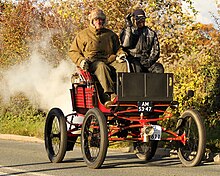Waltham Steam
The Waltham Steam was an American steam car.

George Tinker and John Piper
[edit]Engineers George M. Tinker and John W. Piper were employees of the Waltham Manufacturing Company,[1] at that time makers of Orient brand bicycles in Waltham, Massachusetts. In 1898, they were allowed by the company's owner, Charles Herman Metz, to build a light steam buggy at a corner of the plant. This vehicle was finished at the end of the year and named the Waltham Steam. It had a very light 50 lb (23 kg), 3 hp (2.2 kW) two cylinder, double acting steam engine. The copper-built condenser weighted in at 110 lb (50 kg), and the complete vehicle at only 600 lb (270 kg). It had wire wheels, and steering was provided by a vertically mounted lever. Tinker and Piper exhibited their steam buggy at the Boston Automobile Show in 1898.[2]
Two more steam cars followed under the label Tinker & Piper. Meantime, Metz had sold out his company to Charles A. Coffin and H.P. Clough but stayed in the position of a general manager. Coffin was an executive of the General Electric Company (GE). Seeking markets for GE products, he ordered a light electric car to be made by Tinker and Piper. They built it also at the Waltham Manufacturing plant. It had a wheelbase of 60 in (150 cm) and an electric motor by General Electric. It was presented as the Orient Electric at the New York Cycle & Automobile Show in 1899. Neither Tinker and Piper nor Metz were impressed, and there were no more electric vehicles to follow.[2]
Waltham Automobile Company
[edit]In 1899[3] or early 1900,[2][4] Tinker and Piper left the Waltham Manufacturing Company through consensual agreement with, and support from, Charles Metz, to start their own business.[2] Their Waltham Automobile Company was located at 130-136 Newton Street in Waltham[4] and started building small steam-powered stanhopes that sold for $750[1][2][4] with a Victoria top.[4] Further, there might have been some steamers with Vis-à-vis coachwork.[4]
Production ended in 1902[1][2] or 1903.[4]
Of the unknown number of Waltham steam vehicles built, one Stanhope is still in existence.[4]
Waltham of Springfield, Massachusetts
[edit]An unrelated company in Springfield, Massachusetts also produced a steam powered automobile under the Waltham name in 1905.[1]
See also
[edit]References
[edit]- ^ a b c d Kimes, Beverly Rae; Clark, Henry Austin Jr (1996). Standard Catalog of American Cars: 1805–1942. Iola, WI: Krause Publications. p. 1612. ISBN 978-0-87341-428-9.
- ^ a b c d e f Kimes, Beverly Rae; Clark, Henry Austin Jr (1985). Standard Catalog of American Cars: 1805–1942. Iola, WI: Krause Publications. pp. 1463. ISBN 0-87341-111-0.
- ^ 100 Years of the American Auto Millennium Edition, Copyright 1999 Publications International, Ltd.
- ^ a b c d e f g Waltham Museum: The Waltham Steam Cars of Piper and Tinker
Sources
[edit]- Beverly Rae Kimes (ed.) and Henry Austin Clark, jr.: The Standard Catalogue of American Cars 1805–1942, 2nd edition, Krause Publications, Iola WI 54990, USA (1985), ISBN 0-87341-111-0
- Beverly Rae Kimes (ed.) and Henry Austin Clark, jr.: The Standard Catalogue of American Cars 1805–1942, 3rd edition, Krause Publications, Iola WI 54990, USA (1985), ISBN 978-0-87341-428-9
- G. N. Georgano (ed.): Complete Encyclopedia of Motorcars, 1885 to the Present; Dutton Press, New York, 2nd edition (Hardcover) 1973, ISBN 0-525-08351-0
- Beverly Rae Kimes: Pioneers, Engineers, and Scoundrels: The Dawn of the Automobile in America. editors: SAE (Society of Automotive Engineers) Permissions, Warrendale PA 2005, ISBN 0-7680-1431-X (Hardcover).
External links
[edit]- Waltham Museum: The Waltham Steam Cars of Piper and Tinker (retrieved 27 February 2013)
- earlyamericanautomobiles.com: Massachusetts Manufactured (Automobiles); chapter 33 (retrieved 27 February 2013)
- Pages using the JsonConfig extension
- Defunct motor vehicle manufacturers of the United States
- Steam cars
- Steam road vehicle manufacturers
- Cars introduced in 1899
- 1890s cars
- 1900s cars
- American companies established in 1899
- Vehicle manufacturing companies established in 1899
- Vehicle manufacturing companies disestablished in 1902
- 1899 establishments in Massachusetts
- 1902 disestablishments in Massachusetts
- Motor vehicle manufacturers based in Massachusetts
- Defunct manufacturing companies based in Massachusetts
- Cars discontinued in 1903
